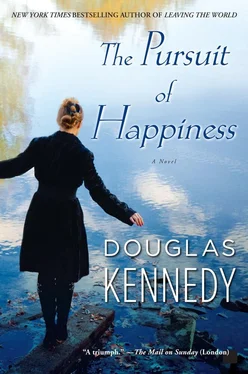'Sure. I understand'.
'Now I've hurt you'.
'Stop', he said softly. 'You don't need to explain'.
By seven that morning, there was no further word on Eric's condition - except that he was out of the operating theater, and had been transferred to the intensive care unit. Jack offered to call in sick to work, but I insisted that he go to his office. He made me promise that I'd call him every hour with an update - even if there was no news.
As soon as he left, I stretched out on a sofa in the waiting room and passed right out. The next thing I knew, a nurse was shaking me. 'Miss Smythe, you can go see your brother now'.
I was instantly awake. 'Is he all right?'
'He lost a lot of blood, but he pulled through. Just'.
I was escorted through the emergency room to a dark, crowded public ward at the extreme rear of the hospital. Eric was in a bed at the end of a row of twenty beds. The noise was deafening - an endless discord of distressed patients, brusque orderlies, and people shouting to be heard over the ward's cavernous acoustic. Eric was groggy, but lucid. He was lying flat, a sheet pulled up to his neck, two large intravenous tubes of plasma and a clear viscous liquid disappearing under the covers. He said nothing for a moment or two. I kissed his forehead. I stroked his face. I tried not to cry. I failed.
'Now that's stupid', he said in a thick, post-anaesthetic voice.
'What?'
'Crying - as if I was dead'.
'A couple of hours ago, you looked dead'.
'I feel it right now. Get me out of here, S'.
'In your dreams'.
'I mean... get me a room. NBC will pay...'
I didn't answer him - as it was pretty damn obvious that he was delirious.
'Get me a room', he said again. 'NBC...'
'Let's not bring that up now', I said, continuing to stroke his forehead.
'They never canceled my insurance...'
'What?'
'In my wallet...'
I nabbed a porter who found Eric's wallet (it had been locked away in the hospital safe after he was admitted - along with his watch and the seven dollars in cash that was his current net worth). In the wallet there was a Mutual Life card, on the back of which was a phone number. I called it - and discovered that Eric was still on the NBC corporate health and life plan.
'Yes, I have been able to dig out his file', said the Mutual Life clerk with whom I spoke. 'And we are aware of the fact that Mr Smythe is no longer an NBC employee. But under the terms of this policy, his medical and life benefits remain in force until December thirty-first, nineteen fifty-two'.
'So I can have him moved to a private room in Roosevelt Hospital'.
'I'm afraid you can'.
Within an hour, Eric was relocated to a small, but reasonably pleasant room on an upper floor of the hospital. He was still deeply groggy.
'What? No view?' was his only comment about his new surroundings before he passed out again.
At four that afternoon, I called Jack and assured him that Eric was out of danger. Then I went home, and slept until morning. When I woke, I found Jack asleep beside me. I curled my arms around him. Tragedy had been averted. Eric had pulled through. And I had this extraordinary man in bed beside me.
'You are everything to me too', I whispered. But he just snored on.
I got up, showered, dressed, and brought Jack breakfast in bed.
As always, he lit a cigarette after taking his first sip of coffee.
'How are you bearing up?' he asked.
'You know, the world always looks better after twelve hours of sleep'.
'Damn right. What time are you heading to the hospital?'
'In about a half-hour. Can you come with me?'
'I've got this early meeting in Newark...'
'No problem'.
'But give him my best. And tell him I'm here if he needs me for anything...'
On my way down to the hospital, the thought struck me that Jack had worked out his own way of dealing with my brother. Ever since the blacklisting, he'd been scrupulously correct (and generous) towards Eric - but from a careful distance. He avoided having to deal with him face to face. I couldn't blame him... especially as he well knew that the FBI had his name as the man in my life. And I hugely admired the fact that he had, in his own quiet way, stuck by Eric throughout this crisis... whereas many people would have been terrified to even be vaguely associated with him.
Eric was awake when I reached the hospital. Though still gaunt and haggard, a minor hint of color had returned to his cheeks. And he was a bit more lucid than yesterday.
'Do I look as bad as I feel?'
'Yes. You do'.
'That's direct'.
'You deserve direct. What the hell were you trying to do?'
'Drink a lot'.
'And not eat at the same time?'
'Food takes up valuable boozing time'.
'You're lucky that Joey at the Ansonia was with you...'
'I really wanted to go, S'.
'Don't say that'.
'It's the truth. I couldn't see a way out...'
'I've told you over and over, you will get through this. But only if you let me help you through it'.
'I'm not worth the price you've paid...'
I rubbed my thumb and forefinger together.
'Know what this is? The world's smallest violin'.
He managed a smile. I took his hand. And said, 'What else do we have except life?'
'Booze'.
'Maybe - but I've got some bad news on that front. According to the doctor I spoke to on the way in here, your drinking days are over. Your duodenal is now hanging on by a thread. Given time, it should repair itself. But even after it heals, your stomach won't be able to handle booze anymore. Sorry to tell you this...'
'Not as sorry as me'.
'The doctor also said you're going to be in here for at least two weeks'.
'At least NBC has to pick up the tab'.
'Yes - that is rather gratifying'
'What about my little appearance in front of HUAC next week?'
'I'll get Joel Eberts to postpone it'.
'Permanently, if possible'.
As it turned out, Mr Eberts was only able to get a month-long postponement of the HUAC subpoena. During that time, Eric managed to dry out and recuperate. After his two-week stay at Roosevelt Hospital, I convinced him to let me rent us a cottage in Sagaponack. Back then, that corner of Long Island was still completely undeveloped. Sagaponack was a tiny fishing village - a real briny, ungentrified community of lobster boats and spit-on-the-floor bars and leathery-looking fishermen. Even though it was only three hours by train from Manhattan, it felt completely remote. The place we rented was a simple weatherbeaten two-bedroom structure which fronted a vast empty beach. At first, Eric could only manage to sit in the sand, and stare out at the breaking waters of Long Island Sound. By the end of our two weeks there, he was walking a mile or so on the beach every day. Though he was on a strict bland diet (I became an expert at making macaroni-and-cheese), he still managed to put on a little weight. More tellingly, he started to sleep eight to ten hours a night. We did as little as possible during the day. There was a shelf of cheap detective novels in the cottage - which we devoured. There was no radio, no television. We didn't buy a newspaper during the entire two weeks of our stay. Eric let it be known that he wanted to cut himself off from the world beyond this beach. I had no objections to this plan. After the past few weeks, I too wanted to slam the door on that jumbled disorder called life. Of course, I missed Jack terribly. I'd invited him to come out for a few days - but he said he was currently overwhelmed at work... and the weekends were out because those days were sacrosanct for Dorothy and Charlie. There was no phone at the cottage. Instead, I would walk in to the village twice a week and wait in the post office for a call from Jack. The agreed time was three in the afternoon on Tuesdays and Thursdays. He was always prompt. The local postmistress also ran the switchboard, and struck me as a deeply nosy type - so I was careful not to mention anything about the blacklist or Jack's family on the phone. If she was listening in (and I'm pretty sure she was), all she heard was two people missing each other terribly. But every time I suggested he try to pop out for just a day and a night, Jack was adamant that he was under far too much work pressure right now.
Читать дальше












